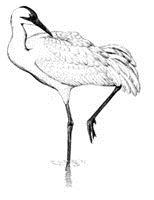North American Crane Working Group

Proceedings of the North American Crane Workshop
Date of this Version
2018
Document Type
Article
Citation
PROCEEDINGS OF THE NORTH AMERICAN CRANE WORKSHOP 14:137-141
Abstract
Captive-bred Mississippi sandhill cranes (Grus canadensis pulla) suffer from low recruitment in nature, and poor nest defense ability may significantly contribute to the problem. We hypothesized that a lack of opportunities for social learning by young birds prior to release inhibits the development of appropriate nest defense in later life. Here we report the results of preliminary experiments on conditioning of antipredator behavior in young birds prior to release using predator models. Observing agonistic displays by either costumed technicians or parent birds toward a model raccoon (Procyon lotor) promoted aggressive displays to a wild raccoon, but additional exposure to wild raccoons outside of training sessions instead promoted habituation. Pre-release conditioning of crane chicks can induce antipredator behavior useful in nest defense, but optimal procedures remain to be determined.
Included in
Behavior and Ethology Commons, Biodiversity Commons, Ornithology Commons, Population Biology Commons, Terrestrial and Aquatic Ecology Commons


Comments
Copyright © 2018 North American Crane Working Group. Used by permission.
Proceedings may include articles not presented at Workshop.